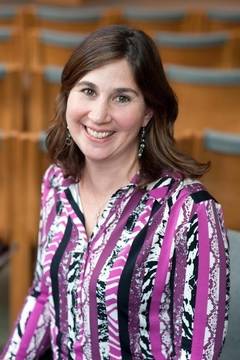Message from Rabbi Gelber

April 3, 2020/9 Nisan 5780
Dear Friends,
For three weeks, my table has been all things to everybody. A place for prayer. A place for study. A place for questioning. A place for trying to answer. A place for conversation. A place for silence. A place for learning. A place for creating. A place for sitting. A place for standing. A place for eating. A place for drinking. A place for cleaning. A place for folding. A place for unfolding. A place for trying. A place for setting things aside. A place for talking. A place for listening. A place for gathering. A place for re-setting and re-setting and re-setting.
Each day I wonder, how many times can I reset the table, move the place-mats to make room for the computers, shift the computers to make space for the water bottles, transfer the place-mats to make space for the hi-lighters and colored pencils and post-its, and where did I put my reading glasses? How can they not be on the table? The table of everything.The table that sits as an invitation for all aspects of the day. I can see the sky from my table. I still know day from night. Many of the buildings around us are empty, belonging to schools that have long since emptied out. Still, there are windows with people on the other side. As I gaze at the snippet of the Hudson and beyond from our table, I wonder about the tables in those homes. What purpose do those tables serve? Are they places of comfort? Places of nourishment? Are they places of holiness and refuge like our table?
The table in Judaism represents the altar, the place at which offerings were given over - daily - to Gd. In this week's parasha, Tzav, we see that even the ashes that burned on the altar were seen as sacred and holy. A burnt offering was to burn all night upon the altar until morning. And, the Torah is explicit, v'eish hamizbeach tukad bo/the fire on the altar is kept going on it (Lev. 6:2). This insured the entirety of the sacrifice was given over to the Holy One. The altar remained a site of continual flame. Some read tukad bo as within him, i.e., the fire had to burn within the priest overseeing the sacrifice. One can understand why an officiant should have a burning passion for their work. But there is more going on here, I believe. The altar represented the fire of tradition. It was there that the bond between humans and the Holy One was fed and tended. It was there that even/or perhaps especially the ash was treated with reverence. It was there that the continual light reflected possibility and connection, through human intervention.
This stoking of the fire is precisely what we need now at our tables. In less than a week, we will sit at the table, like our ancestors to eat the seder foods and tell our story. For those looking for virtual seder, go to www.seder2020.org . At the first Pesach, the home was literally and figuratively a place of holy refuge. While chaos reigned and rained outside, our people stayed safe within. The parallels to life in the time of COVID-19 are striking. Death and destruction are in the air outside the windows. Inside the home we must remember who we are and keep connected to our story, stoking the flames of the values that continue to carry us in this time - nourishment of mind, body and spirit, concern for the poor and at risk, connection to past and commitment to future.
Even before Passover, we have Shabbat, a time set aside to remember the gift of creation and the exodus from Egypt as offered in Shabbat Kiddush/prayer over the wine. Shabbat reminds us how to set the altar in sacred surroundings and that sparks of holiness exist in chaos. This evening, they'll be no many course meal at my table. Instead, we'll welcome Shabbat with community here on zoom https://zoom.us/s/251458276 (for audio only by phone dial 646 558 8656; MTG ID 251 458 276#). Then, clearing away the computers and putting out the place-mats, kiddush cups and challah cover, we'll enjoy homemade pizza and maybe some ice cream. Tonight, make your table a place of holy refuge. Invite someone to join you via zoom, FaceTime or speaker phone. Or just enjoy some quiet intentional moments looking out the window and praying the tables out there are filled with love.
Shabbat Shalom from my table to yours,
rg





